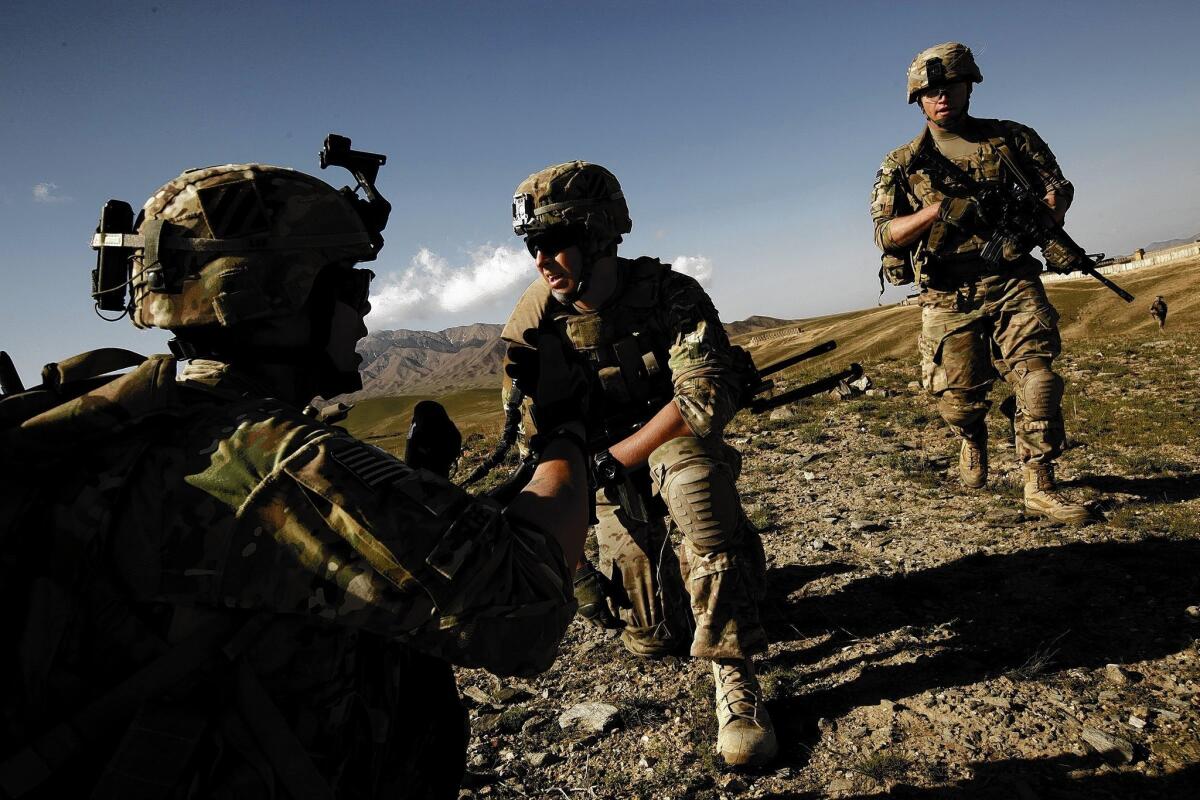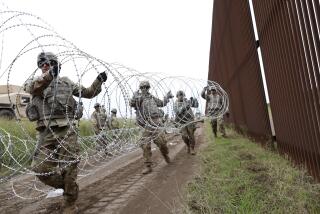Top general to ask Obama to keep more troops in Afghanistan

WASHINGTON — The U.S. commander in Afghanistan is planning to go to the White House on Monday to argue for keeping about 10,000 troops in the country after this year, a subject that has exposed a fissure between some of President Obama’s top advisors and the Pentagon.
Marine Corps Gen. Joseph F. Dunford Jr., who commands all international forces in Afghanistan, is recommending that U.S. troops stay to help train Afghan forces and conduct counter-terrorism operations against Taliban insurgents and Al Qaeda-linked militants. All other U.S. troops will be withdrawn this year.
To make the deployment more attractive to a skeptical White House, Dunford says the 10,000 should pull out by 2017, when Obama leaves office, according to two officials, who confirmed a Wall Street Journal report. The Pentagon previously had favored deploying the troops for a decade.
But Vice President Joe Biden and other key White House aides favor leaving only 1,000 to 2,000 troops, said the officials, who spoke anonymously to discuss internal deliberations. Pentagon officials say a force that size is too small to protect itself while also conducting operations.
Biden argues that the insurgency has been contained after 13 years of war and that Afghan security forces are strong enough to preserve security in urban and other key areas. He also says a stable Afghanistan is no longer critical to halting terrorist attacks against the United States, one official said.
The Dunford plan has won support from Defense Secretary Chuck Hagel, Secretary of State John F. Kerry, CIA Director John Brennan and Army Gen. Martin Dempsey, chairman of the Joint Chiefs of Staff, the officials said.
Biden’s proposal is backed by Antony Blinken, the deputy national security advisor, and Douglas Lute, a retired Army general who now is U.S. ambassador to the North Atlantic Treaty Organization. Obama’s national security advisor, Susan Rice, is a “wild card” who has not made clear which option she favors, one official said.
It’s not clear the dispute will be resolved Monday, the day before Obama delivers his annual State of the Union address.
White House officials had hoped Obama could use the speech to announce his decision, but that’s all but impossible because Afghan President Hamid Karzai has yet to sign a bilateral security agreement that has been negotiated.
White House spokeswoman Caitlin Hayden said Friday that there had been no decision on future troop levels. She declined to comment further.
Dunford is making the unscheduled trip to make his case face to face with Obama’s national security team, one official said. He usually participates by video from his headquarters in Kabul. Army Gen. Lloyd Austin, who oversees Afghanistan as head of U.S. Central Command, is also expected to attend.
Dunford will recommend keeping only a few hundred U.S. troops if Obama rejects his plan for 10,000, the officials said. They would run an office in the U.S. Embassy that would manage military aid programs, the officials said, but not conduct training or operations.
If Dunford’s plan is adopted, about one-sixth of the force — around 1,800 to 2,000 special operations troops — would be reserved for counter-terrorism operations. The rest would support, train and advise Afghan commanders, but would be barred in most cases from participating in combat except for self-defense.
Most of the troops would work at Bagram air base, north of Kabul, and at Kandahar air base in the south. A small contingent would be based around Kabul to help train Afghan forces.
Beyond the roughly 10,000 U.S. troops, the plan calls for stationing another 2,000 to 3,000 troops from allied countries near Mazar-i-Sharif in the north, led by a German contingent, and Herat in the west, under Italian command, the officials said.
Some officials believe it’s increasingly likely that no U.S. troops will remain after this year, either because Karzai or his successor will refuse to sign the security agreement, which provides legal immunity to U.S. troops, or because Obama is not persuaded by either Dunford or Biden.
More to Read
Start your day right
Sign up for Essential California for news, features and recommendations from the L.A. Times and beyond in your inbox six days a week.
You may occasionally receive promotional content from the Los Angeles Times.






